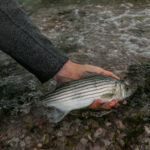
Albies Win in North Carolina: New Guardrail Management Rule Approved
After years of data pouring in from The Albie Project, advocacy, persistence, and support from
Sector separation is a concept that splits the recreational sector into two groups. The charter-for-hire and party boats would be separated from the recreational private fishermen. Right now, we are all together as one sector.
The call for sector separation has become increasingly louder in the Mid-Atlantic and the Northeast over the last few years. The concept spawned in the Gulf of Mexico with the red snapper fishery. Let’s take a look at that before we get into what is going on in the Atlantic. We are just going to give you the major points because this article is not about red snapper.
Red snapper were chronically overfished since the 1970’s. In 2006, the Magnuson-Stevens Act was reauthorized because many stocks were in bad shape. Annual catch limits and rebuilding timelines became part of the law. As a result, the red snapper stocks came roaring back.
Red snapper are managed in state waters as well as federal waters. The charter for hire industry had to purchase Gulf Permits to fish for red snapper in federal waters. These permits limited entry and were extremely expensive. I may be slightly off but these permits are going for about 25k now. If you have a Gulf Permit, you are bound by federal size, season, and creel limits.
The states were allowed to set the regulations in their inshore waters and this resulted in chronic overfishing. So much so, that the federal season was limited to days, not weeks or months. Essentially, the charter-for-hire fleet was completely excluded from the fishery while states like Texas had a 365 day fishery with a four fish per person limit inside their waters.
There is a lot more to the story but the bottom line is that the charter-for-hire operators were able to carve out their own quota and therefore their own season IN FEDERAL WATERS. Since this is managed under MSA, they have a hard quota and are responsible and accountable for it. They were being shut out of a fishery due to states chronically overfishing. The entire ordeal was toxic even though it was righting a wrong.
Well, some of the charter-for-hire folks in the Mid-Atlantic and Northeast love the thought of this. But, few understand the differences in the issues as well as the fisheries. The major differences are that red snapper has a hard quota for the charter for hires with robust accountability measures for overfishing. The charter-for-hire sector in Maryland will have pseudo sector separation in 2020 with no accountability for overfishing and no quota specific to the industry. Essentially, they can kill more fish with zero measures in place beyond reporting (Which they were already required to do).
Now, we can get into the application of sector separation in the Northeast and the Mid-Atlantic. It isn’t the same. It isn’t about accountability. It should also be understood that we (ASGA) are in the charter-for-hire sector and we don’t agree with it as it is trying to be applied.
We will try to address accountability, reallocation of specific fisheries, and MRIP. Each one of these issues is a key component of sector separation. As you will see, this is not a way to right a wrong in this situation. It is nothing more than a way to keep killing fish that need a break in order to rebound from coastwide depletion.
The cries of accountability are very loud. Charter-for-hires are claiming that because they have to fill out report forms, they are more accountable than private rec anglers. At the last ASFMC meeting, we made a hard push for accountability measures for any state that decided to use conservation equivalency for striped bass. Why? Because the last CE proposal from Maryland decimated the 2011 year class. There was no accountability for overfishing, no paybacks, not so much as a whimper after the damage was done. Our push for accountability was shot down by Maryland and the Potomac River Fisheries Commission as well as Rhode Island. Oddly enough, these are the three jurisdictions that are essentially reallocating the resource to charter-for-hire operators. The point is that we asked for accountability and didn’t get it. So, the accountability argument has been neutered. The private recreational angler community wants to be accountable. However, managers opposed it. What kind of message does that send? You ask for accountability, don’t get it, and are punished for it. Let’s get something straight. The punishment isn’t limiting how many fish you can take home. The punishment is allowing a tiny segment that kills a lot of fish to continue harvest at the cost of the resource. Filling out a logbook won’t help that. Again, we asked for accountability. The request was denied. Yet you say the private rec angler is not accountable. Tell me how that works again because I am kind of confused.
Let’s talk about the reallocation of the resource. MSA has 10 National Standards that are the basis of the law. The fourth standard discusses allocation while National Standard 5 raises some serious questions about what is going on with striped bass and bluefish. Please understand that since striped bass are managed by ASMFC, they are not held to these standards, but bluefish are.
Conservation and management measures shall not discriminate between residents of different states. If it becomes necessary to allocate or assign fishing privileges among various United States fishermen, such allocation shall be (a) fair and equitable to all such fishermen; (b) reasonably calculated to promote conservation; and (c) carried out in such manner that no particular individual, corporation, or other entity acquires an excessive share of such privilege.
Conservation and management measures shall, where practicable, consider efficiency in the utilization of fishery resources; except that no such measure shall have economic allocation as its sole purpose.
The mantra of “We will go out of business if we can’t take home more fish” has reached a crescendo. The members of ASGA do kill fish. But, we are more interested in having fish to catch than having fish to harvest. National Standard 5 sure seems like a stumbling block for the argument that reallocation based on perceived economic harm is the right thing to do.
In the case of Maryland and striped bass, charter-for-hire’s will be allowed to continue to harvest 2 fish while the recreational private sector can only harvest one if they electronically report on a system called FACTS. In Rhode Island, the recreational size limit will be 32-40″ while the charter-for-hire limit will be 30-40″. Furthermore, the new coastwide bluefish limits will be 3 fish for private rec anglers and 5 for charter-for-hire. All of this is nothing short of a reallocation of the resource without anything that resembles a fair process.
Finally, let’s discuss MRIP. MRIP is the much maligned Marine Recreational Information Program. It is the statistical model that tells us how many fish are harvested and how many trips are taken by the private rec sector. Let’s get something straight right off the bat. MRIP is a statistical program that is designed to give information on a coastwide basis and is better suited for annual harvest numbers. As you drill down to one month of harvest in one state, the data becomes very inaccurate. This isn’t some groundbreaking news story. In fact, if you query the database, you will see the percent standard error listed for each query. If you get above a 25% PSE, the data is pretty much thrown out.
So, why did ASMFC allow Maryland to use MRIP data with a 50% PSE to close April to all targeting of striped bass? Yeah, we don’t know either. But, that’s the problem. ASMFC continually allows flawed data to be used so states can exploit MRIP to harvest more fish. Why? Well, you can’t sue ASFMC when the knowingly break their own rules. If you want to talk about accountability, let’s start there.
Let’s bring everything back together so we are very clear on our position. The charter-for-hire fleet is not being shut out of any fishery like in the case of red snapper. Striped bass and bluefish are overfished and we all need to take cuts. They believe that sector separation is the answer to maintain status quo in their harvest rates. It isn’t about accountability either. It is about using MRIP in ways it wasn’t designed to work and then pointing out the flaws. We asked to accountable and were denied. Own that. If you don’t, we will continually remind you of it until you are sick of hearing it. ASMFC is not accountable. MRIP was accepted by the National Academy of Sciences. Those are the people we should be listening to. We shouldn’t allow the flaws in MRIP to be exploited.
To be as concise as possible, this is what we believe:
That pretty much sums it up. We will fight for the resource not for a bigger allocation. We will fight for future generations of fishermen. We will fight for a healthy marine ecosystem so all sectors can flourish. We all need abundant fish populations to continue to pursue our dreams. We oppose sector separation for bluefish and striped bass. We need to come together to recover the population, not fight for the last piece of the pie.

After years of data pouring in from The Albie Project, advocacy, persistence, and support from

This morning, the Connecticut Environment Committee held a hearing on House Bill 6248, a bill

Photo Credit: A striper released in Connecticut waters, courtesy of Mike Querfeld. Connecticut House Bill 6248 (2025

Feature Photo Credit: Rex Messing and the SIMMS team fishing with Captain Jaime Boyle Albie
We rely on our members and donations to keep fighting for a sustainable tomorrow in marine conservation.
Notifications
One Response
Say it louder for the people in the back! – We will fight for future generations of fishermen. We will fight for a healthy marine ecosystem so all sectors can flourish. We all need abundant fish populations to continue to pursue our dreams. We oppose sector separation for bluefish and striped bass. We need to come together to recover the population, not fight for the last piece of the pie.